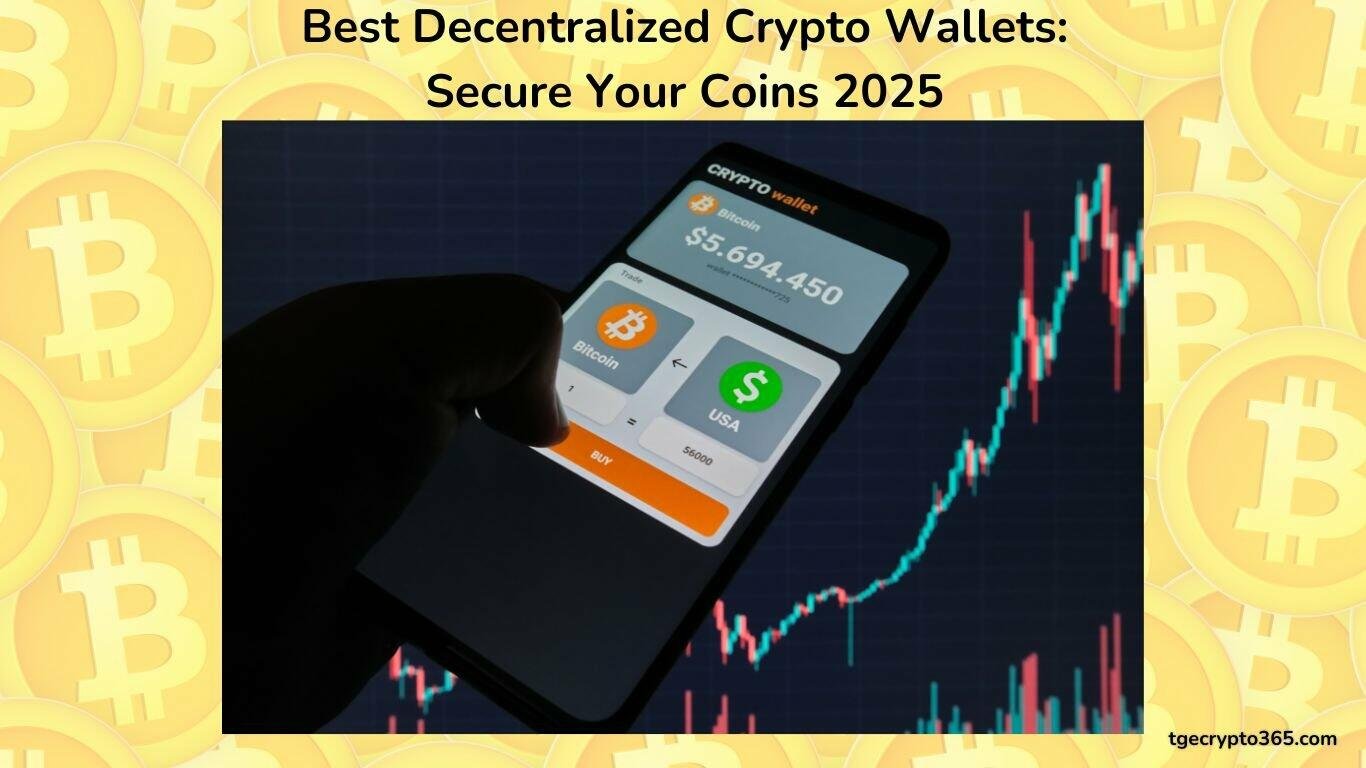Best Decentralized Crypto Wallets – If you love cryptocurrencies, you know the top wallets get great reviews. They score between 3.3 to 4.35 out of 5.
This shows users really like the best decentralized crypto wallets. With more people using decentralized exchanges (DEXs) and self-custody wallets, picking a secure one is key.
In this article, I’ll show you the best decentralized wallet options. We’ll look at their features, benefits, and how they keep your coins safe.
Key Takeaways
- Decentralized crypto wallets give you full control over your private keys. This means more security and freedom for you.
- Top choices like Ledger and Trezor support many cryptocurrencies. They also have strong security features.
- Secure providers, like MetaMask, let you manage your assets and stake cryptocurrencies. You can also use decentralized applications (DApps).
- Self-custody wallets, like Ledger and Trezor, are top choices for security. They’re offline, so they’re less vulnerable to online threats.
- When picking a wallet, think about the user interface, how easy it is to use, and customer support. This ensures a smooth experience.
- The use of DEXs is expected to rise a lot. So, it’s important to choose a reliable and secure wallet provider.
- Decentralized wallets have lower fees than centralized exchanges. This makes them a great choice for traders.
Understanding Decentralized Crypto Wallets
Users have many options for storing cryptocurrencies, including decentralized wallets. To choose a decentralized crypto wallet, it’s key to know what makes them special.
These wallets are non-custodial, giving users full control over their funds.
Comparing decentralized wallets shows they have strong security. They use multi-signature support and two-factor authentication. They also let users make peer-to-peer transactions without needing third parties.
For new users, the best decentralized wallet for beginners should be easy to use, secure, and work with many cryptocurrencies.
Popular wallets like MetaMask, Trust Wallet, and Coinbase Wallet are great choices.
They support many cryptocurrencies, including Bitcoin and Ethereum. When picking a wallet, think about security, how easy it is to use, and if it works with your cryptocurrencies.
In summary, knowing about decentralized crypto wallets is vital for safe cryptocurrency storage. By looking at their features and benefits, users can pick the right wallet for their needs.
| Wallet | Compatibility | Security Features |
|---|---|---|
| MetaMask | Ethereum, ERC-20 tokens | Multi-signature support, two-factor authentication |
| Trust Wallet | Bitcoin, Ethereum, ERC-20 tokens | Two-factor authentication, biometric authentication |
| Coinbase Wallet | Bitcoin, Ethereum, ERC-20 tokens | Two-factor authentication, multi-signature support |
Best Decentralized Crypto Wallets for Different Needs
Choosing a decentralized crypto wallet can be tricky. Each wallet has its own decentralized wallet features and decentralized wallet benefits.
Beginners need a wallet that’s easy to use and set up. Hot wallets like MetaMask and Trust Wallet are great for newbies because they’re simple and fast.
For those with more experience, decentralized wallet reviews are very helpful. They show the good and bad sides of each wallet.
For example, Exodus and ZenGo are praised for their flexibility and security. Here’s a quick look at some popular wallets:
| Wallet | Supported Blockchains | User Rating |
|---|---|---|
| MetaMask | Ethereum, ERC-20 tokens | 4.8 stars |
| Trust Wallet | Over 70 blockchains | 4.2 stars |
| Exodus | 364 cryptocurrencies | 4.1 stars |
The right wallet for you depends on what you need and like. Look at the decentralized wallet features, decentralized wallet benefits, and decentralized wallet reviews.
This way, you can pick a wallet that makes using cryptocurrency better for you.
Security Features and Protection Mechanisms
Storing cryptocurrencies safely is a big deal. To find the most secure crypto wallet, we need to look at its security features.
A good wallet should manage private keys well, have backup and recovery options, and support multi-signature.
Important security features include encryption standards like AES-256, multi-factor authentication, and biometric authentication. These help keep your funds safe from unauthorized access.
It’s also key to think about the wallet type.
For example, hardware wallets are safer than software wallets because they keep private keys offline. When searching for the best decentralized crypto wallet, focus on its security features and how it protects your money.
Knowing about the security features of different decentralized crypto wallets helps users choose wisely.
Whether you’re after the most secure crypto wallet or the best decentralized one, security should be your main concern.
| Wallet Type | Security Features |
|---|---|
| Hardware Wallet | Offline private key storage, encryption, multi-factor authentication |
| Software Wallet | Encryption, multi-factor authentication, biometric authentication |
Top Mobile Decentralized Wallets
Managing your cryptocurrencies on-the-go is easier with a good mobile wallet. The best decentralized crypto wallets are known for their ease of use, security, and convenience.
MetaMask and Trust Wallet are top choices because they’re easy to use and keep your assets safe.
These wallets let you store, send, and receive different cryptocurrencies.
They’re perfect for managing your digital assets from anywhere. With the growth of DeFi, mobile wallets are key for using dApps and joining DeFi activities.
Using a mobile decentralized wallet offers many benefits. You get convenience, top security, and support for many cryptocurrencies. You can also use DeFi apps and join DeFi activities.
When picking a mobile wallet, think about security, how easy it is to use, and if it works with your device.
Choosing a top wallet means your cryptocurrencies are safe and easy to access. This lets you fully enjoy your digital assets.
Leading Desktop Wallet Solutions
Users have many options for managing cryptocurrencies on a desktop. A comparison can help beginners find the right wallet. Popular choices include Exodus, Electrum, and MetaMask.
These wallets have great features like security measures. For example, Electrum lets users set their own transaction fees. This gives users more control over their transactions.
Windows Compatible Options
Exodus is a top pick for Windows users, supporting over 1000 cryptocurrencies. It also has a portfolio tracking tool. Electrum is another good choice, mainly for Bitcoin but with advanced features.
Mac OS Solutions
MetaMask is a favorite for Mac users, with over 30 million monthly users. It makes switching between Web3 solutions easy and supports over 500,000 tokens.
Trust Wallet also supports over 1 million assets across more than 50 blockchains.
When picking a wallet, think about security, ease of use, and compatibility. A comparison can help beginners find the best wallet. This improves their cryptocurrency experience.
Hardware Integration and Compatibility
Choosing the right decentralized crypto wallet is key. You need to think about hardware integration and compatibility. Wallets like Ledger and Trezor boost security and ease of use.
Hardware wallets offer better security and ease.
For example, Ledger Nano X is highly recommended for its security and trust. Exodus also supports over 300 cryptocurrencies and works with Trezor, giving you many options.
When picking a hardware wallet, look at cost, security, and compatibility. Prices range from $50 to over $200, based on features. Here’s a table of popular wallets and their features:
| Wallet | Cost | Security Features | Compatibility |
|---|---|---|---|
| Ledger Nano X | $100-$150 | High-level security | Windows, Mac, Linux |
| Trezor One | $100-$150 | Advanced security features | Windows, Mac, Linux |
| Exodus | Free | High-level security | Windows, Mac, Linux |
In summary, picking the right decentralized crypto wallet is important. Look at features like hardware integration and compatibility for a safe and easy crypto experience.
DeFi Integration and Smart Contract Support
Decentralized wallets with DeFi integration and smart contract support offer many benefits. They give users access to lending, yield farming, and staking. MetaMask and Trust Wallet are praised for making it easy to use DeFi apps and manage assets.
These wallets can give users higher returns than traditional savings accounts. Some users have seen yields up to 20% or more. DeFi also cuts out middlemen, lowering fees by up to 90%.
When picking a decentralized wallet, look at its DeFi integration and smart contract support. Here are some top choices:
- MetaMask, which supports Ethereum and more
- Trust Wallet, with over 140 million users and support for over 100 blockchain networks
- Ledger Wallet, which keeps private keys offline for extra security
Understanding DeFi integration in decentralized wallets can improve your crypto experience. The right wallet can offer higher returns, lower fees, and better security.
| Decentralized Wallet | DeFi Integration | Smart Contract Support |
|---|---|---|
| MetaMask | Yes | Yes |
| Trust Wallet | Yes | Yes |
| Ledger Wallet | Yes | Yes |
Cost Comparison and Transaction Fees
Choosing a decentralized crypto wallet means looking at costs and fees. I often wonder which wallet does elon musk use? and which is the most secure crypto wallet? to protect my assets.
Transaction fees vary across different wallets.
For example, Binance charges 0.1% for spot trading, dropping to 0.075% with Binance Coin (BNB). Kraken Pro, on the other hand, starts at 0.25% for makers and 0.40% for takers, with discounts for big traders.
Here are some key transaction fees to consider:
- Binance: 0.1% maker and taker fees, with discounts for BNB payments
- Kraken Pro: 0.25% maker and 0.40% taker fees, with discounts for high-volume traders
- KuCoin: 0.1% maker and taker fees, with discounts for KuCoin Tokens (KCS) payments
- Bybit: 0.1% maker and taker fees, with discounts for VIP users
Fees can quickly add up, so it’s important to pick a wallet that fits your trading style and budget. Knowing the fees helps users make smart choices and save on transactions.
Conclusion: Choosing Your Ideal Decentralized Wallet
The best decentralized crypto wallets are secure and easy to use. When picking a wallet, think about security, how easy it is to use, and if it works with your digital assets.
Wallets like Zengo, Crypto.com Onchain, and Guarda are great for keeping your assets safe. They support many digital assets.
On the other hand, wallets like Exodus, Trust Wallet, and Coinbase Wallet are easy to use. They work well with popular blockchain networks. This makes managing your digital assets simple.
Choosing the right decentralized wallet depends on your needs. Whether you want to store your crypto, use a top wallet, or find a secure provider, there’s a wallet for you.
By looking into different options, you can find a wallet that helps you manage your crypto well. This way, you can confidently use decentralized finance.
FAQ
What makes a wallet decentralized?
A decentralized wallet lets users control their own private keys. This means they don’t rely on a central authority. It keeps their funds safe from outside control.
What are the benefits of using a decentralized crypto wallet?
Decentralized wallets offer better security and control over your funds. They also protect your privacy and keep you independent from third parties.
This gives users more freedom and safety with their digital assets.
What are the key features to look for in a decentralized wallet?
Look for security features, an easy-to-use interface, and support for many cryptocurrencies. Also, check for DeFi integration and if it works with hardware wallets.
How do decentralized wallets ensure the security of user funds?
They use private key management and backup options to keep funds safe. Multi-signature support also helps prevent unauthorized access. These steps help protect against loss or theft.
What are the top mobile decentralized wallets available?
MetaMask, Trust Wallet, and Exodus are top choices for mobile wallets. They offer convenience, easy access, and secure storage for your cryptocurrencies.
What are the best desktop decentralized wallet solutions?
Atomic Wallet, Exodus, and Electrum are the best for desktops. They support Windows, Mac OS, and Linux, catering to different user needs.
How important is hardware integration and compatibility for decentralized wallets?
Hardware integration is key for wallet security. Using Ledger or Trezor with a decentralized wallet adds extra protection. It makes your funds even safer.
What DeFi features are available in decentralized wallets?
Decentralized wallets often connect to DeFi platforms. They offer trading, staking, and NFT storage. This makes it easy to explore the DeFi world.
How do transaction fees work with decentralized wallets?
Transaction fees vary based on network congestion and gas prices. Knowing the fee structures helps users manage their costs. It’s important for efficient cryptocurrency transactions.
Disclaimer:
I am not a Financial Advisor. This content is for informational purposes only. Always consult a qualified professional before making financial decisions.











[…] to the Crypto Wallet section in the […]